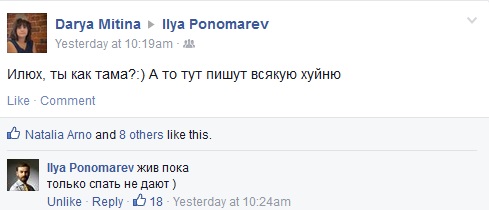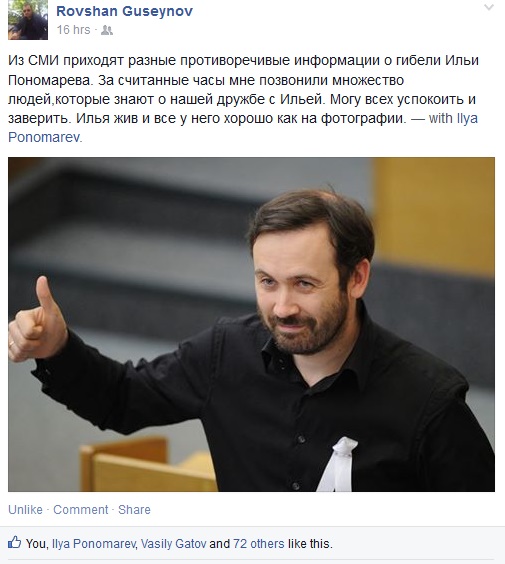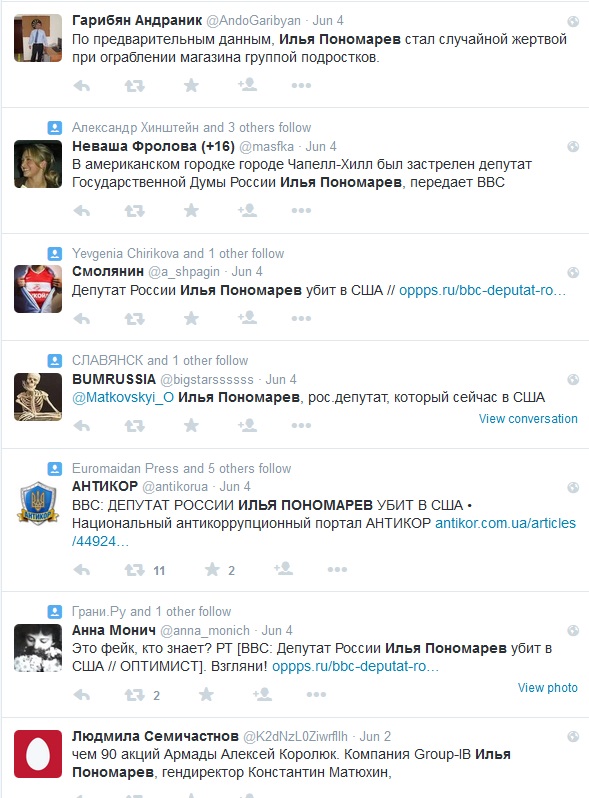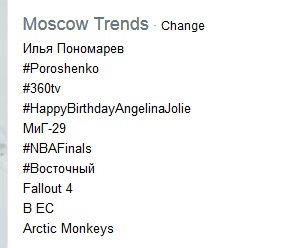Bloomberg News reports a major probe by Deutsche Bank into $6 billion in Russian transactions that may involve money-laundering.
Welcome to our column, Russia Update, where we will be closely following day-to-day developments in Russia, including the Russian government’s foreign and domestic policies.
The previous issue is here.
UPDATES BELOW
Russia This Week:
– Is ‘Novorossiya’ Really Dead?
– From Medal of Valor to Ubiquitous Propaganda Symbol: the History of the St. George Ribbon
– What Happened to the Slow-Moving Coup?
– Can We Be Satisfied with the Theory That Kadyrov Killed Nemtsov?
– All the Strange Things Going On in Moscow
Special features:
– With Cash and Conspiracy Theories, Russian Orthodox Philanthropist Malofeyev is Useful to the Kremlin
– Alexey Navalny On the Murder of Boris Nemtsov
– Theories about Possible Perpetrators of the Murder of Boris Nemtsov
– Novaya Gazeta Releases Sensational Kremlin Memo
Please help The Interpreter to continue providing this valuable information service by making a donation towards our costsâ€.
Tech journalist Adrian Chen, writing for the New York Times Magazine, has uncovered a connection between a hoax involving a chemical plant explosion in and the Kremlin troll farm in St. Petersburg.
“The Agency” is an impressive piece of long-form journalism with many twists and turns and a fortuitous discovery that came from Chen’s pouring over social media networks and links.

The Agency
Читайте эту статью на русском. Around 8:30 a.m. on Sept. 11 last year, Duval Arthur, director of the Office of Homeland Security and Emergency Preparedness for St. Mary Parish, Louisiana, got a call from a resident who had just received a disturbing text message.
Internet Research, as the firm is known, churns out a good
chunk of the pro-Kremlin social media and forums trolling and is already
infamous for its role in promoting President Vladimir Putin’s view of
the world, particularly about the war in Ukraine, which Russia still
pretends does not involve its military.
We’ve covered the “Kremlin’s troll farm” a number of times, including some longer studies:
Russia This Week: The Kremlin’s Growing Army of Internet Trolls
Russia This Week: Here Comes the Kremlin’s Troll Army
A company in the same building as Internet Research was involved in
creating “Ukrainian” news sites actually run from Russia. Recently a
former employee quit in disgust and took her former employer to court.
But
what was not known until now is that this ideological warfare shop is
also used for “sabotage” type disinformation campaigns involving the increasing
connectivity of SCADA systems to the Internet.
As Chen wrote:
Dozens of journalists, media outlets and politicians, from Louisiana to
New York City, found their Twitter accounts inundated with messages
about the disaster. “Heather, I’m sure that the explosion at the
#ColumbianChemicals is really dangerous. Louisiana is really screwed
now,” a user named @EricTraPPP tweeted at the New Orleans Times-Picayune
reporter Heather Nolan. Another posted a screenshot of CNN’s home page,
showing that the story had already made national news. ISIS had claimed
credit for the attack, according to one YouTube video;
in it, a man showed his TV screen, tuned to an Arabic news channel, on
which masked ISIS fighters delivered a speech next to looping footage of
an explosion. A woman named Anna McClaren (@zpokodon9) tweeted at Karl
Rove: “Karl, Is this really ISIS who is responsible for
#ColumbianChemicals? Tell @Obama that we should bomb Iraq!” But anyone
who took the trouble to check CNN.com would have found no news of a
spectacular Sept. 11 attack by ISIS. It was all fake: the screenshot,
the videos, the photographs.
Chen embarked on a long trial following these accounts as he also researched Russian hackers:
The chain that links the Columbian Chemicals hoax to the Internet Research Agency begins
with an act of digital subterfuge perpetrated by its online enemies.
Last summer, a group called Anonymous International
— believed to be unaffiliated with the well-known hacktivist group
Anonymous — published a cache of hundreds of emails said to have been
stolen from employees at the agency. It was just one hack in a long
series that Anonymous International had carried out against the Kremlin
in recent months. The group leaked embarrassing photos of Putin allies
and incriminating emails among officials. It claimed to have hacked into Prime Minister Dmitri Medvedev’s phone, and reportedly hacked his Twitter account, tweeting: “I’m resigning. I am ashamed of this government’s actions. Forgive me.”The
emails indicated that the Internet Research Agency had begun to troll
in English. One document outlined a project called “World Translation”;
the problem, it explained, was that the foreign Internet was biased four
to one against Russia, and the project aimed to change the ratio.
Another email contained a spreadsheet that listed some of the troll
accounts the agency was using on the English-language web. After
BuzzFeed reported on the leak, I used the spreadsheet to start mapping
the network of accounts on Facebook and Twitter, trying to draw
connections.
Eventually, through following one account to another and triangulating them, he stumbled on a connection that then led back to the Louisiana hoax.
The article opens up a number of questions, especially as Russian hackers in general have been more active in attacking the US, notably in the SONY case and in the recent State Department and White House hacks.
What other incidents might have organized Russian intervention behind them, although they seemed like “just pranks” or the work of the ostensibly leaderless swarm of Anonymous (such as the disruption of the rape court case in Steubenville).
The Russian hackers who seem to “do good” by exposing the Kremlin’s manipulation of the media and opposition are sometimes called “Anonymous International” although in Russian they are known by the name Shaltai Boltai, which is a character in a nursery rhyme who is the equivalent of Humpty Dumpty. Is there in fact any connection between these movements? (Usually the Russian media reports that there is not, but it is not certain.) Anonymous in the US and Europe almost never takes any position antithetical to the Kremlin; indeed, it is usually allied with WikiLeaks, which is pro-Kremlin.
There are also questions about Shaltai Boltai, given that they never seem to expose the files or communications of any very high officials, despite gaining access to some lower-level Kremlin officials. A lot of the hacks have revolved around figures who once led the youth movements like Nashi (Ours) organized by Kremlin aide Vladislav Surkov who have now left the Kremlin. Are these hackers really about state transparency or is it one bureaucratic faction fighting another via social media? Why do they only seem to get as far as hacking Dmitry Medvedev’s Twitter?
Delving back deeper into the history of Russian journalism on this topic, why were the original journalists and bloggers who covered the government’s manipulation of social media with the “troll farms” forced to flee abroad, and then essentially disappear? Where are they and what happened to them?
Will the vandalized Wikipedia entry on this topic ever get rectified?
There’s a strange epiphenomenon with the plethora of these popular “Kremlin troll articles” — they play to a belief that there is a significant number of Russian people who don’t actually believe what the trolls write, i.e. these disinformation workers only write this because they are paid.
Then it seems as if pro-Kremlin commentary — which often obliterates debates on media forums — isn’t really so serious a problem, since it’s just paid trolls anyway. It implies that the Russian people themselves have different beliefs than their chief propagandists — which is not necessarily the case. So the corrosive effect continues.
The New York Times translated this report into Russian, and already opposition leader Alexey Navalny has tweeted it:
Translation: The Russian World is advancing and here The New York Times is publishing an article in Russian. True, it’s about trolls.
The “Russian World” is a phrase that connotes Putin’s ideology that there is a worldwide ethnic Russian and Russian-speaking community that Russia can justify defending even with military actions abroad. The “advance” is a reference to the Russian-backed separatists’ advance on Ukrainian towns this week.
The Kremlin disclaimed any connection to the “troll farms”:
Translation: Peskov stated that the Kremlin does not know about the “troll factory” agency and has not commissioned anything there.
— Catherine A. Fitzpatrick
The Russian media has been covering in recent weeks the story of Varvara Karaulova, a Moscow State University (MGU) student, who seemed to “have it all” but who disappeared May 27 and was believed to have run away from home to join ISIS.

Today the news came that Turkish authorities had detained her on the border of Syria, Gazeta.ru reported, noting that Pavel Karaulov, her father had confirmed the arrest.
Karaulova, 19, will now be deported back to Russia and the Interior Ministry “will think about opening a criminal case,” says Gazeta.ru.
RIA Novosti said that she was detained in Kilis making an illegal border crossing and was turned over to Turkish migration authorities.
The Russian Interior Ministry credited Interpol and close coordination between Russian and Turkish authorities for the finding of the girl. Her father told Gazeta.ru that he used his connections with the FSB and Foreign Ministry and soon discovered that Varvara had left Russia on a flight to Istanbul. The hunt for her began.
Karaulova may find herself charged with “attempt to participate in an unlawful armed group” (Art. 30 and Art. 208 of the Russian Criminal Code), said authorities.
The Russian Foreign Ministry said on their Facebook page that the father’s claim that his daughter’s passport for foreign travel was given by the Foreign Ministry was not true. The Foreign Ministry said that the document was issued in April 2015 by the Federal Migration Service in Moscow.
But in an interview with Gazeta.ru, Pavel Karaulov insisted that his daughter had obtained the passport without her parents’ knowledge from the Foreign Ministry.
Karaulova was an honors student at the cultural studies department of the Faculty of Philosphy at MGU who came from a well-connected and affluent family and did not seem to have any problems previously. She was fluent in English and French and received a gold medal for her studies.
She began to read books on Islam recently and also to practice Asian martial arts. Her friends said that after she went missing recently, she changed her name on WhatsApp from Varvara to “Amina” which she wrote in Arabic script. Friends say she began studying Arabic last year and broke off relations with them. But Nikolai Pavlov, a teacher of Arabic said she only knew the alphabet. He said she came to classes in a scarf or hijab but he didn’t suspect anything was wrong.
Karaulova’s mother said that her daughter began studying Islam when she divorced her father. She became very obsessed and even stopped playing with her pet dog, as the Koran says dogs are “unclean.” Her mother added that she did not think her daughter was involved with any man that might have brought her into a sect.
An attorney for the family said he believed Karaulova was recruited and that psychological methods were used on her to indoctrinate her.
The Russian National Anti-Terrorist Committee says from 800 to 1,500 Russians were recruited to ISIS last year. FSB Director Aleksandr Bortnikov gave the figure of 1,700 at a White House conference last year.
— Catherine A. Fitzpatrick
Opposition parliamentarian Ilya Ponomarev is alive and well, he posted
on his Facebook — adding for good measure the posts of good friends who
contacted him and confirmed he was okay.

Translation: Ilya, how are you over there? : ) They’re writing all sorts of crap here.
Ilya Ponomarev: I’m still alive, they just don’t let me sleep )

Translation: Rovshan Guseynov: There is various contradictory information in the media about the death of Ilya Ponomarev. Within hours numerous people call me who know of our friendhsip.I can calm and reassure everyone. Ilya is alive and everything is as well with him as it is in this photograph.
Yesterday, Russian-language social media such as Twitter was
flooded with fake news stories that Ponomarev had been supposedly “the accidental victim of group of teenagers robbing a store” in Chapel Hill, NC. The degree of detail in the
story seemed to give it mileage.
Sketchy sites like oppps.ru reprinted the “BBC story.”

BBC: Депутат России Илья Пономарев убит в США
В американском городке городе Чапелл-Хилл был застрелен депутат Государственной Думы России Илья Пономарев, передает BBC. По предварительным данным, Илья Пономарев стал случайной жертвой при ограблении магазина группой подростков. Полиция Чапелл-Хилл ведет поиск преступников, которым удалось скрыться до их прибытия. Жертвой подростков, также, стал владелец магазина, в котором произошло ограбление.
This is the third time Ponomarev has suffered rumors of his fake death, which seem to appear when he makes a speech or when there is some development in his case.
This week Ponomarev announced that he had retained, on a pro bono basis, the famous human rights attorney Robert Amsterdam, who has defended a number of opposition and human rights activists in Russia and other countries.
Ponomarev was stripped of his immunity by the Russian parliament after going abroad when authorities began to pursue a criminal case against him, widely believed to be trumped up, in retaliation for his opposition activities. Ponomarev is the only member of the State Duma to have voted against the annexation of Crimea.
The fake news gained credibility by invoking “the BBC” as the source, and by being spread through accounts that had been followed back by some reputable Twitter users, which shows up on Twitter searches — and for some lent credibility.

There were so many tweets and searches that Ponomarev even trended on Moscow Twitter last night along with the Arctic Monkeys:

Russian intelligence has long used the technique of harassing opposition members by spreading rumors of their injury or death to intimidate them. Unfortunately, these rumors are now more successful than ever following the recent poisoning on May 26 of opposition journalist Vladimir Kara-Murza, Jr. and the assassination of opposition leader Boris Nemtsov on February 27.
Kara-Murza, Jr. finally came out of a coma and began to recognize relatives and speak this week after suffering kidney failure and being listed as serious condition. The investigation of Nemtsov’s murder continues with the arrests of 5 Chechen suspects. But Ruslan Geremeyev, a Chechen police officer in the troops personally controlled by Chechen leader Ramzan Kadyrov, who is believed to have organized the murder, is rumored to have fled Russia.
— Catherine A. Fitzpatrick
Says Bloomberg:
Deutsche Bank AG is conducting an internal probe into possible money
laundering by Russian clients that may involve about $6 billion of
transactions over more than four years, according to people with
knowledge of the situation.
The Bank of Russia approached Deutsche Bank in October asking the
firm to examine the stock-trading activities of some clients in the
country, said one person, who asked not to be identified because the
discussions are private. The German lender is analyzing data from 2011
through early 2015, and has alerted Britain’s Financial Conduct
Authority, the European Central Bank and Germany’s Bafin of the
investigation, the people said.
“We are committed to participating in international efforts to detect
and combat suspicious activities and we take strong action where we
find evidence of misconduct,” Deutsche Bank said in an e-mailed
statement Friday. “We have placed on leave a small number of individuals
from our Moscow operation pending the results of an internal review.”
Deutsche Bank shares fell 1.3 percent after the report, trading at
27.54 euros at 3:26 p.m. in Frankfurt, down 2 percent. They are up about
10 percent this year.
The transactions involve stocks bought by Russian clients in rubles
through Deutsche Bank, and simultaneous trades through London in which
the bank bought the same securities for similar amounts in U.S. dollars,
the people said. Deutsche Bank is probing whether the transactions
allowed Russian clients to move funds out the country without properly
alerting the authorities, one of the people said. The bank is also
examining whether it should have alerted regulators sooner, the person
said
The Russian business daily Kommersant has reported the probe but hasn’t published any analysis yet.
The value of the ruble against the dollar and euro was taking a
beating this week with the renewed Russian offensive in Ukraine and the
continued fall in the price of oil, said RBC.ru. There have also been some measures by the Central Bank such as buying $100 to $200 million per day, lest the ruble grow “too strong” and upset budgets. The ruble was at 50 to the dollar at mid-month.
The
ruble recovered some of that loss today going down to 55.55 to the
dollar but then was creeping back to 57 this afternoon Moscow time. The
euro is currently at 63 rubles.
Economist Vladimir Tikhomirov believes that if the war does not worsen, the ruble may stay at 60 per dollar.
— Catherine A. Fitzpatrick